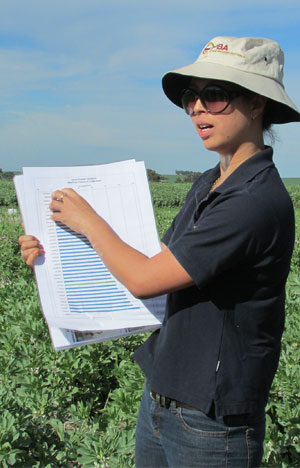Australia
March 31, 2016
Grains industry research and development efforts are delivering growers pulse crops with unprecedented weed control and crop rotation options.
Work funded by the Grains Research and Development Corporation (GRDC) and being undertaken by the South Australian Research and Development Institute (SARDI*) and the University of Adelaide is driving the development of improved herbicide tolerance in pulse crops.
Pulse crops play an important role in sustainable farming systems, however, the lack of safe or suitable weed control options limits their use in Australian production. The development of herbicide tolerance traits in pulse crops has been identified by industry as a major breeding priority.
Pulse growers currently have limited herbicide control options available, however many of these, such as metribuzin, have a narrow safety margin for application and have led to yield losses in seasons conducive to herbicide damage.
Through the GRDC-funded project, germplasm with improved levels of herbicide tolerance has been successfully developed in faba beans, lentils and chickpeas.
The first herbicide-tolerant lentil “XT” varieties were recently released by Pulse Breeding Australia (PBA) in conjunction with lentil commercial seed partner, PB Seeds.
 SARDI researcher Dili Mao (pictured) says the rapid and widespread adoption of the XT lentil varieties by growers indicates that there is likely to be a strong demand for these traits in other pulse crops, particularly faba beans for which no in-crop broadleaf weed control options are currently available.
SARDI researcher Dili Mao (pictured) says the rapid and widespread adoption of the XT lentil varieties by growers indicates that there is likely to be a strong demand for these traits in other pulse crops, particularly faba beans for which no in-crop broadleaf weed control options are currently available.
Speaking at recent GRDC Grains Research Updates, Ms Mao said development of Group B herbicide-tolerant faba bean lines was now well advanced, with varieties expected to be released in three to five years.
She said the project’s overall aim of development of pulse lines with low levels of herbicide tolerance from existing germplasm as well as high levels of improved tolerance from novel germplasm would help to improve grower confidence, expand weed control options and reduce the rotational limitations of pulse crops.
“All traits are being progressed in PBA breeding programs, and new traits will continue to be evaluated,” Ms Mao said.
More information on research into developing improved herbicide tolerance in pulse crops can be found in Ms Mao’s GRDC Grains Research Update paper at http://grdc.com.au/Research-and-Development/GRDC-Update-Papers.
* SARDI is a division of Primary Industries and Regions South Australia (PIRSA).